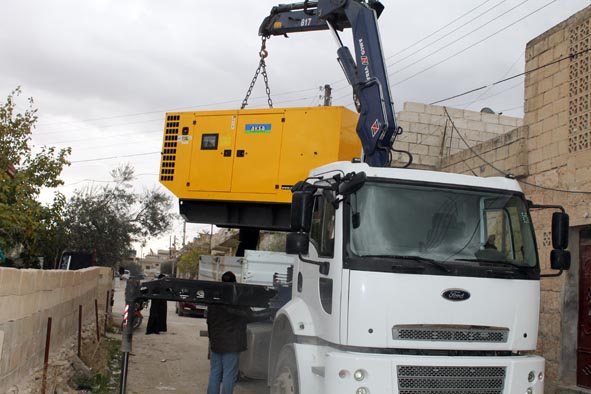Sparking Up Kfar Nabel’s Power Supply

Saeed takes a car battery to work with him every day. He doesn’t own a vehicle, but needs some way to power the lights in his house. So the 33 year-old carries the cumbersome piece of equipment every time he travels from his home in a remote village to his job in a city bakery. There, he can charge the battery ready for his long commute home again.
Saeed has been doing this for over two years, ever since the government bombed Zayzun power plant, previously the main source of electricity in Idlib province.
Now, thanks to an initiative being rolled out in Kfar Nabel, things are about to change. Saeed’s remote house will soon be receiving electricity provided by a local generator.
This project was launched in early October 2015 by Kfar Nabel’s local council in collaboration with the Syria Regional Program (SRP) run by Chemonics International.
It aims to supply electricity to Idlib and its rural areas, with a special focus on houses in more remote parts of the province.

“The project will cover 60 per cent of Kfar Nabel, where generators are being installed according to population density. These areas were identified by a survey conducted by Kfar Nabel’s local council in November 2014,” project director Ziad al-Raslan told Damascus Bureau.
The SRP has allocated 188,000 US dollars for the project. Initially, five generators will be installed, along with circuit breakers and cables stretching over 18 kilometres of ground.
Each generator has a capacity of 170 kilovolt-ampere (kVA) and will supply at least 250 houses.
“The total number of generators to be installed by the completion of the project will be 22 generators,” al-Raslan added.
Kfar Nabel’s local council advertised the newly created positions, and by the time the first five generators had arrived a competent workforce had been hired.
The team comprises of a deputy director, an electrical technician, a mechanical technician, and a number of operators and administrators.
DEMAND AND SUPPLY
The project has already proved extremely popular.
“We are finding it hard to cope with the increasing demand for our services,” deputy director Abdalla al-Jalal told Damascus Bureau.
The project was especially attractive due to its ability to reach remote houses, and the steady stream of electricity that could not be tampered with.
One generator has been set aside for use during major breakdowns that require more than 24 hours of repair work. This means that subscribers are guaranteed a daily five-hour uninterrupted supply of electricity.
“We are currently providing the maximum number of houses with electricity, any increase would put pressure on our production capacity. Therefore we can no longer accept new subscribers, which leads to frustration amongst them,” added al-Jalal.
The team is also struggling to ensure clients keep up with their payments. Many subscribers are failing to keep up with their monthly subscription fee.
Mustafa al-Sheikh, a finance officer with the local council, stressed that subscription holders had to cooperate with the project administration to ensure the electricity supply.
“The local council has warned its subscribers that those who do not pay their fees will be referred to court,” he said.
SERVING CITIZENS
Electricity provided by Kfar Nabel’s new generators is allocated strictly for private households and small businesses.
One woman, Umm Muhanad, said that it has already had a huge impact on her life.
“I was exhausted from washing my household laundry by hand,” the 26 year-old said. “Now I can use my washing machine again.”
Her six year-old son Muhanad was thrilled to once again be able to watch his favourite cartoons on TV, a pleasure he had been deprived of for a very long time.
Another subscriber, Abu Saeed, praised the service for offering good value for money.
“The generators are brand new which means they rarely break down. In contrast, private generators are old and frequently break down, especially with the poor quality of the fuel they run on,” the 54 year-old said.
However, some local residents disagreed.
“Services provided by the private sector are always better than those provided by the public sector,” said 35 year-old Ziad.
“The local council is a public institute and therefore any instability on the ground could affect it. I am worried that if something goes wrong, I will be deprived of the electricity supplied by both sectors”.
For his part, Abu Mohammed, 29, said he was grateful to the project administration for the service it had provided.
The weak power provided by private generators had not been enough to run his fridge and washing machine, he said, although he blamed the strong supply from the council’s generators for damaging several of his electrical appliances.
Nevertheless, he said it was a relief to no longer be at the mercy of the owners of private generators.
Project director al-Raslan said that their ultimate aim is to ensure all private houses could access the power supply, and even cater for large institutions such as bakeries and hospitals in the future.
Mostafa al-Jalal is the pseudonym of a Damascus Bureau contributor from Kfar Nabel, Syria.
Read the Arabic version of this article here
